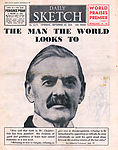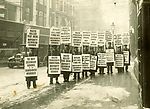 Neville Chamberlain, perhaps the most well known of those associated with appeasement
Neville Chamberlain, perhaps the most well known of those associated with appeasement TUC call for boycott of German goods 1933
TUC call for boycott of German goods 1933

Today the term "appeasement" is used as synonymous with defeatism, or "selling-out". In the 1930s, those politicians who fostered the policy did not see it as such; indeed they thought it was the means, perhaps the only means, to continued peace. To compromise with Hitler, to come to an accommodation with him, to appease him, would prevent him from resorting to war. Such was the thinking behind the policy; it was consistent with a widespread mood of the time.
Side by side with this anti-war spirit was the view of some statesmen of the middle 1930s that Germany had been badly treated at the peace table following the First World War, and should now be allowed political readjustment. Statesmen of the time assumed that Hitler’s demands could be met. What they found outrageous were not the changes he wanted, but the tone in which they were demanded. Even then, many assumed Hitler’s public stance was struck to win the support of the German people, not threaten the integrity of European peace.
The desire for peace was very strong within the Western democracies. One world war had been enough to convince many that another would mean the destruction of European civilization. Pacifists invested their hopes for peace in the League of Nations, an organisation set up specifically to broker bloodless resolutions to international conflicts. A ‚Äúpeace ballot‚ÄĚ, in 1934 and 1935, supported by the TUC and Labour Party was held in order to enable people to express their views on a series of questions concerning peace. It was signed by over eleven and a half million, the vast majority of whom stated that they endorsed the League of Nations and the quest for peace. Over ten million believed that if a nation insisted on attacking another, the other nations should combine to compel it to stop by economic and non-military measures. Six million expressed the view that, if necessary, military measures should be used.
Perhaps the most well known of the appeasers was Neville Chamberlain. Son of the famous manufacturer and politician Joseph Chamberlain, Neville Chamberlain approached foreign affairs with something of a businessman‚Äôs attitude. He believed that differences could be negotiated or settled, in much the same way that accounts could be balanced. Chamberlain was a sincere man, and one deeply dedicated to peace; he genuinely strove to preserve ‚Äúpeace in our time‚ÄĚ. He assumed, until quite late in the negotiations, that Hitler was a reasonable man whose political demands were limited. It was while Chamberlain was Prime Minister (1937 ‚Äď 1940) that appeasement reached its climax with the Munich settlement of September 1938, by which Britain tried to avoid war over Czechoslovakia by agreeing to Nazi demands for the annexation of the German-speaking parts of that state known as Sudetenland. In all of this neither the interests of Czechoslovakia were considered nor its leaders consulted. However, Hitler did not stop with just a piece of Czechoslovakia. Early in 1939 he took control of the rest of the country. Chamberlain felt he had been deceived.
In a final diplomatic coup Hitler signed a ‚ÄúNon-Aggression Pact‚ÄĚ with the Soviet Union in August 1939. Although violently anti-communist, Hitler knew that he had to secure his eastern border in preparation for the invasion of Poland. Britain had already signed a pact of mutual assistance with the Polish government. When Hitler‚Äôs war machine, the Wehrmacht, invaded Poland on September 1st 1939, Britain and France responded; they declared war on September 3rd 1939.
Rollover the captions in the box to see the available images in thumbnail format, click the caption to see the full-size image
| Reference: | 757 |
| Keywords: | |
| Archive Ref: | |
| Updated: | Wed 9 Jul 2008 - 10 |
| Interpretation written by | Barbara Harris |
| Author's organisation | |
| Organisation's website |